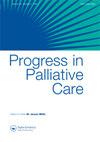护士对严重精神疾病患者姑息治疗障碍的认知:一项定性研究
IF 0.9
Q4 PUBLIC, ENVIRONMENTAL & OCCUPATIONAL HEALTH
引用次数: 0
摘要
据推测,在精神病病房采取姑息治疗方法有可能提高严重精神疾病患者的护理质量。本研究旨在解释护士对为SMI患者提供姑息治疗障碍的看法。在这项定性内容分析研究中,对26名伊朗护士进行了半结构化访谈。形成了两个类别和四个子类别。这些类别包括组织和专业基础设施薄弱,以及患者/家庭随访系统不足。第一类包括缺乏提供姑息治疗的专家,缺乏姑息病房,以及缺乏团队合作。第二类包含错误的文化信仰和对家庭作用的不重视。社会必须通过基于文化的干预措施来处理与精神疾病相关的文化禁忌。此外,还应注意家庭在姑息治疗中的作用。卫生系统应努力建立相关的姑息治疗单位,以促进为SMI患者提供姑息治疗。本文章由计算机程序翻译,如有差异,请以英文原文为准。
Nurses’ perception regarding barriers of palliative care provision for people with severe mental illness: A qualitative study
It has been postulated that a palliative approach in psychiatric ward has the potential to increase the quality of care for people with severe mental illness (SMI). This study aimed to explain nurses’ perception about barriers to provision of palliative care for people with SMI. In this qualitative content analysis study, semi-structured interviews have been conducted with 26 Iranian nurses. Two categories and four subcategories were formed. The categories included poor organizational and professional infrastructure, and inadequate patient/family follow-up system. The first category includes lack of specialists who provide palliative care, lack of palliative wards, and lack of teamwork. The second category contained erroneous cultural beliefs and lack of attention to the role of family. The society must deal with the cultural taboos associated with mental illness through cultural-based interventions. Furthermore, attention should be paid to the role of families in palliative care. The health system should try to build relevant palliative care units to facilitate the provision of it for people with SMI.
求助全文
通过发布文献求助,成功后即可免费获取论文全文。
去求助
来源期刊

PROGRESS IN PALLIATIVE CARE
PUBLIC, ENVIRONMENTAL & OCCUPATIONAL HEALTH-
CiteScore
2.60
自引率
11.80%
发文量
24
期刊介绍:
Progress in Palliative Care is a peer reviewed, multidisciplinary journal with an international perspective. It provides a central point of reference for all members of the palliative care community: medical consultants, nurses, hospital support teams, home care teams, hospice directors and administrators, pain centre staff, social workers, chaplains, counsellors, information staff, paramedical staff and self-help groups. The emphasis of the journal is on the rapid exchange of information amongst those working in palliative care. Progress in Palliative Care embraces all aspects of the management of the problems of end-stage disease.
 求助内容:
求助内容: 应助结果提醒方式:
应助结果提醒方式:


